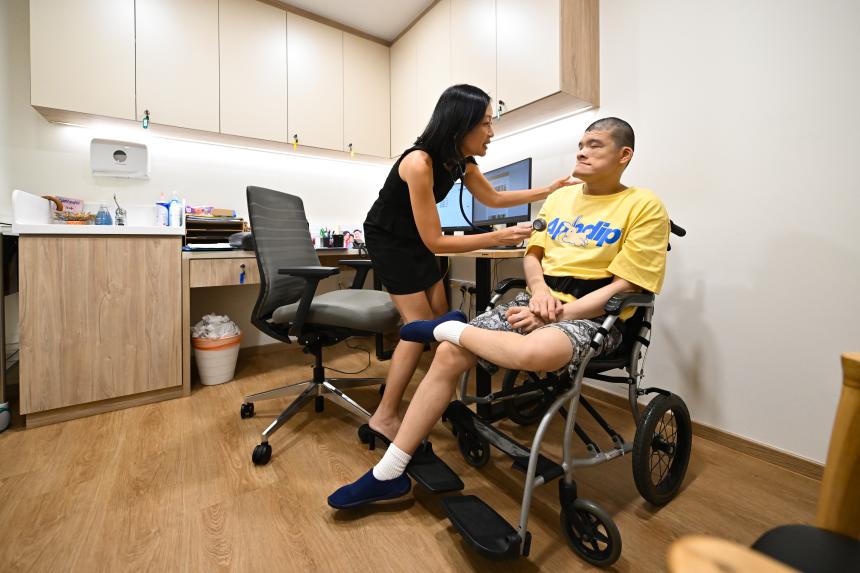SINGAPORE – When 39-year-old Kenji Lee, who has intellectual disability, visits Dr Chen Shiling at her clinic in Upper Thomson, they are familiar with each other and the physician is able to put him at ease.
Having seen Mr Lee since 2019 for various issues, Dr Chen knows what his usual behaviour is when he is happy, or in pain or ill, and can then use that information to assess him and diagnose what troubles him, said Mr Lee’s sister Yvonne Lee, 41.
The clinic IDHealth, which began in end-2019 as a pilot by Dr Chen, caters specifically to adults with intellectual disability, and their caregivers and families. It moved into the Thomson space in September 2022.
It has about 200 patients now, and supports about 300 caregivers, said Dr Chen, who also founded the Happee Hearts charity to advocate for those with intellectual disabilities.
The patients, mostly referred from various agencies and hospitals, range from those in their 20s to the oldest at 90. They may have mild, moderate or severe intellectual disability and may also have autism.
The IDHealth service, which has a team of about 15 full-time staff, operates under the charity.
Dr Chen said she set up the clinic after years of volunteering to help those with intellectual disabilities, and conducting volunteer-run health screenings for them.
“If they had seizures, I could refer to neurologists or when they had joint problems, to the orthopaedists. But I realised there was no one to support them as a whole,” she added.
At her clinic, she sees not just the adult with intellectual disability, but also his family, to address their needs together.
For example, if a 40-year-old patient with epilepsy has an ageing mother with osteoporosis, she might be at risk of falling when rushing to help during the patient’s seizure.
“Both may then end up in hospital and in the long term end up in nursing homes. We want to address their needs in an integrated and holistic manner,” said Dr Chen.
She said that there are three main barriers for people with intellectual disability in accessing appropriate healthcare.
First, the patients generally have cognitive and communication limitations that make it difficult for them to answer questions doctors usually pose.

Second, their caregivers are ageing. They have their own health issues and struggle with the repercussions of lifelong caregiving, making it more difficult to bring their children to the hospital or the doctor.
Third, the knowledge, skill set and experience among healthcare practitioners is not high for treating those with intellectual disability, especially when these clients become adults, said Dr Chen.
She said she started the clinic to bridge these gaps.
The clinic at Upper Thomson Community Hub is open five days a week. Appointments are needed to see a doctor.
Clinic consultations cost between $30 to $200 depending on medication or further investigations, and government schemes and subsidies can be utilised to offset costs.
Each patient is also linked up with a nurse and social worker, whom the family can contact freely if they need advice, and who also go to homes to assess and support where needed, said Dr Chen.
Ms Lee said before her brother started going to IDHealth, it was a headache to bring him to see the doctor.
As he grew older, more health and behavioural problems also arose as compared with his teenage years.
As he does not speak and is unable to control his actions, regular doctors do not know how to assess him, and often turn to the relative accompanying him instead, said Ms Lee.

With Dr Chen, since the team has established Mr Lee’s usual behaviours for various conditions, they are able to more easily come up with potential diagnoses before narrowing it down, she added.
“IDHealth looks at Kenji as a whole person. He’s not just like a heart or a collection of organs,” Ms Lee said.
Having a social worker tagged to the family has also been a source of stress relief, as she can share about issues that are non-medical, but with the confidence that the person understands her family and situation, said Ms Lee, the oldest of three children.
Her mother is 67, and her father is 73. Her younger sister is 35.
Dr Chen said that apart from focusing on clinical services, the team also wants to build capability in healthcare service providers.
The clinic partners 40 general practitioners, who receive referrals for patients who are stabilised and can be supported by a clinic nearer to home.
IDHealth and GPs also share care where appropriate, such as working with a GP to manage certain issues like high blood pressure while IDHealth handles other more complex issues, said Dr Chen.
The clinic also has about 40 volunteers who cover a variety of roles such as befriending, or providing specialised skill sets, such as dermatologist Ker Khor Jia.
Since May, she has been running a free evening dermatology consult service twice a month, to help patients with skin conditions.
Explaining her reason for volunteering, Dr Ker said: “Dermatological issues may be viewed by many as a low-priority medical need, in view of other more pressing conditions they may have.
“However, the impact on quality of life is significant, affecting their daily activities and sleep.”


